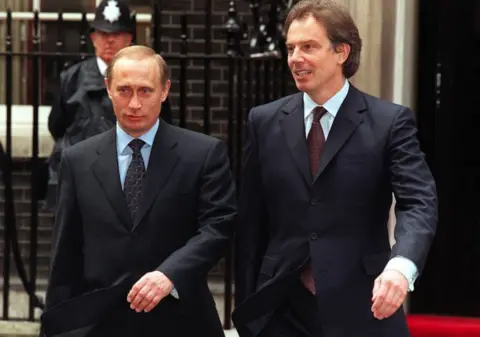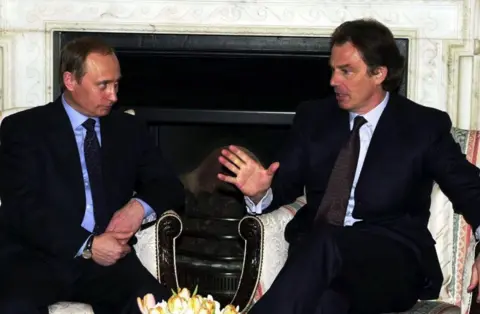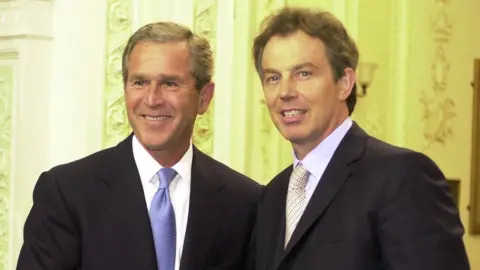National Archives: Tony Blair said Putin should be on 'top table'
 PA Media
PA MediaTony Blair argued Vladimir Putin should be given a seat at the world's "top table" despite misgivings from officials, newly released files reveal.
Papers released by the National Archives show in early 2001, the then-prime minister believed it was important to encourage the new Russian president to adopt Western values.
But officials questioned if the ex-KGB spy could be trusted.
Files also show Mr Putin offered to build a gas pipeline to the UK.
In early 2001, Mr Blair explained his approach to the Russian President telling new American Vice-President Dick Cheney that it would encourage him to "reach for" Western attitudes and the West's economic model.
He said Mr Putin was a Russian patriot, sensitive to Russia's "loss of respect" in the world, and had a similar "mindset" to French President Charles de Gaulle, though the two were not directly comparable.
 PA Media
PA MediaThe Russian President was the first world leader to be given a pair of silver No 10 cufflinks, as a birthday gift in October 2001.
Behind the scenes, Downing Street officials were more sceptical. A few months earlier, a paper on "Putin's Progress" was prepared for John Sawers, then defence adviser to the prime minister and later head of MI6.
The anonymous writer pointed out that the Russian President's "constructive" comments to Mr Blair were sometimes "belied" by Russian actions.
The long list of examples included the Kursk tragedy, when 118 Russian sailors had drowned. Mr Putin had said he was grateful for the offers of British help. Yet Russian officials had obstructed assistance. They had also repeated unfounded rumours that a collision with a British submarine caused the disaster.
When it came to Nato, Mr Putin had told Mr Blair that he would not try to slow down the process of the bloc's enlargement. At the same time his Defence Minister Igor Sergeyev had told his Nato counterparts it would a be "major political error" and Russia would "take appropriate steps".
Mr Putin spoke warmly of the "closeness" between the UK and Russia. He had even offered to build a pipeline across the Baltic Sea to supply gas to the UK.
 PA Media
PA MediaHe told Mr Blair it would "ensure stable supplies for decades to come". The proposal was raised at a meeting between the two leaders in Moscow in 2002, but that particular pipeline was never built.
Meanwhile, the Russian intelligence presence remained at Cold War levels and "they continue to try to post active and hostile officers to work against British interests worldwide".
'Clinton wanted revenge'
By 2001 the Blair administration had a new US President to deal with too.
The files show it reacted quickly once George Bush's victory was confirmed by the Supreme Court in December 2000. Mr Blair had been close to President Bill Clinton, and wanted to build links quickly with his successor.
Mr Blair was the first foreign leader to call to congratulate the president-elect, in an eight minute phone conversation. The British prime minister asked if they could be on first name terms. The president agreed, but continued to call the prime minister "sir".
Before the president's inauguration, defence adviser John Sawers and Mr Blair's chief of staff Jonathan Powell went to Washington to meet officials and likely members of President Bush's team.
Mr Powell wrote they were welcomed: "They all said they wanted to keep the relationship special. It will not however be as cosy as with the Clinton administration. Unlike Clinton they will not do political favours for us."
Meanwhile, Mr Clinton himself wanted to maintain his friendship with the prime minister, and to attack his successor.
He "wanted revenge" wrote Mr Powell at the end of March 2001.
"We don't really want to be associated with Clinton," he wrote to the prime minister. But the former president's adviser Sidney Blumenthal had "hinted" that Mr Clinton was disappointed Mr Blair had not called saying "you do not want to look like you are walking away from your former friend".
In a scrawled note Blair added: "Why don't I call him soon?"
Other files include then-cabinet minister Mo Mowlam's support for the legalisation of cannabis, and the Blair government's frustration with what one adviser called the "juvenile media".

- MIND GAMES: Can 22 strangers identify 'The Traitors' to win £120,000?
- 'THE THIEF OF TIME': Why do we procrastinate? Can we blame it on our evolution?

